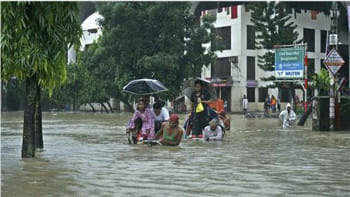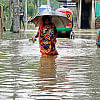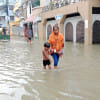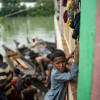Sylhet flash floods bring back haunting memories

We're worried about the evolving flood situation in Sylhet coming hard on the heels of another severe calamity in the form of Cyclone Remal earlier last week, the effects of which are still very much felt. While the nation's focus remained fixed on cyclone-hit communities in southern Bangladesh, the north-east—Sylhet district in particular—was hit by flash floods that began on Wednesday night due to torrential rains and onrush of water from upstream in India's Meghalaya. Since then, at least 6.43 lakh people have been marooned across eight upazilas in Sylhet, according to a report by this daily.
The deluge has swept away many houses and submerged schools, roads, farmlands, and fish enclosures in about 48 unions of these upazilas, compounding the suffering of the victims. There have been acute shortages of food and drinking water. Reportedly, the district administration set up 547 shelters—housing about 3,739 people on Friday, down from 4,802 the previous night—but many more people are in need of shelter, support and rehabilitation. The stories of some of the villagers who talked to this daily are heart-wrenching yet familiar, as flash floods triggered by water influx from upstream areas as well as lack of preparation on our side have ravaged communities in the region many times, most notably during the devastating 2022 flood that went down as a "once-in-122-years" weather event.
While the geopolitics of transboundary river management can complicate things for a region dealing with such events, some after the recent flood have questioned the government's preparations, especially its river dredging programmes which are supposed to help manage water flow and reduce erosions. Experts have also highlighted the importance of preventing encroachments on floodplains that have been quite prevalent in recent years. Clearly, we need to consider both short-term and long-term interventions as we prepare for yet another monsoon season.
Right now, the priority is to ensure that the affected communities in Sylhet, especially those stranded, have food, clean water and medical supplies delivered to them as soon as possible. Floodwaters have begun to recede in many areas but remained above danger levels in other areas. So the administration must focus on repairing critical infrastructure where needed or possible, including roads and schools. Many people have also lost their homes and means of livelihood, so they will require financial assistance to rebuild their lives. The district administration and local representatives must engage with all villagers to ensure that they get the help they deserve.

 For all latest news, follow The Daily Star's Google News channel.
For all latest news, follow The Daily Star's Google News channel. 








Comments